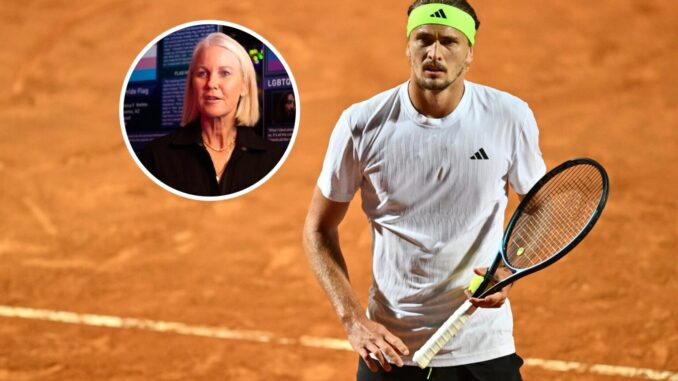
The tennis world is no stranger to fiery debates, but Rennae Stubbs, former coach of Serena Williams and a respected pundit, has ignited a fresh controversy with her scathing critique of Alexander Zverev. Following Zverev’s disappointing quarterfinal exit at the 2025 Italian Open, where he fell 6-4, 7-6(5) to Lorenzo Musetti, Stubbs took aim at the German’s post-match comments, accusing him of behavior she believes tennis legends Novak Djokovic and Roger Federer would never stoop to. Specifically, Stubbs slammed Zverev for blaming the loss on the quality of the tournament’s balls, a complaint she deemed unworthy of a player ranked No. 2 in the world. Her remarks, delivered on *The Rennae Stubbs Tennis Podcast*, have sparked a broader conversation about Zverev’s mindset and his place among the sport’s elite as he heads into the French Open.
Zverev, who reached the Roland Garros final in 2024 only to lose to Carlos Alcaraz, arrived in Rome aiming to defend his 2024 title and bolster his clay-court form. Despite an early 3-1 lead against Musetti, the 23-year-old Italian rallied, capitalizing on Zverev’s unforced errors to secure a stunning victory. Post-match, Zverev vented frustration, claiming the Dunlop balls used in Rome were subpar and affected his performance. “When was the last time Rafael Nadal or Roger Federer or Novak Djokovic complained about the balls? Like what?” Stubbs retorted, emphasizing that such excuses are rare from the sport’s greatest champions. She argued that Zverev’s tendency to deflect blame—whether on equipment or conditions—undermines his potential to join the ranks of the “Big Three.” “No man, your forehand – you are a bigger pusher on that shot,” she added, critiquing his cautious playstyle as a key factor in his defeat.
Stubbs’s comments cut deeper, questioning Zverev’s No. 2 ranking. “Zverev is still number 2 in the world, but he doesn’t deserve to occupy that position in my opinion,” she declared, pointing to his inconsistent performances in high-stakes tournaments. Despite a strong 24-9 record in 2025, Zverev’s season has been marred by setbacks, including a loss to Jannik Sinner in the Australian Open final and a 6-3, 6-4 defeat to Matteo Arnaldi in Madrid. His decision to accept a wildcard into the Hamburg Open, where he won 6-1, 7-6(5) against Aleksandar Kovacevic, reflects a desperate bid for match practice before Paris. Yet, sparse crowds in Hamburg, as highlighted by Nick Kyrgios’s critique of the ATP schedule, underscored the challenges of the congested calendar, adding context to Zverev’s struggles.
The contrast between Zverev and the “Big Three” is stark. Djokovic, Federer, and Nadal, with 24, 20, and 22 Grand Slam titles respectively, are renowned for their mental fortitude and adaptability. Milos Raonic, a former Wimbledon finalist, recently noted Djokovic’s unique ability to neutralize opponents by controlling rallies, saying, “You’ll lose to him 7-6, 6-4, and you’ll be like, ‘I felt good,’ but rewinding it you’re like, ‘I really didn’t have any chances.’” Federer, described by Ivan Ljubicic as a “chess master” for his tactical brilliance, and Nadal, feared for his relentless intensity, rarely attributed losses to external factors. Stubbs’s point is clear: Zverev’s complaints, like those about the Madrid Open’s electronic line-calling, reflect a mindset that separates him from these legends.
Zverev’s frustration in Rome wasn’t his first clash with controversy this season. In Madrid, he criticized the electronic line-calling system, imploring the chair umpire to check a ball mark. Stubbs dismissed this as well, noting, “Machines were just as capable of making calibration errors as umpires were of having a lapse in their judgment.” Her broader critique suggests Zverev’s focus on external issues distracts from addressing his own game, particularly his forehand, which she labeled overly defensive. As Zverev prepares for Roland Garros, where he faces a tough draw and pressure to finally claim a major, his ability to move past such excuses will be crucial.
The tennis community is divided. Some fans defend Zverev, arguing that equipment and conditions can impact performance, while others echo Stubbs, urging him to emulate the resilience of Djokovic, who, despite a title-less 2024, remains a favorite in Paris. “Zverev doesn’t deserve to be the World No. 2,” Stubbs reiterated, a sentiment that challenges the German to prove his mettle on the grand stage. As the French Open begins, all eyes are on Zverev to see if he can silence his critics and rise above the habits Stubbs believes hold him back from true greatness.
Leave a Reply